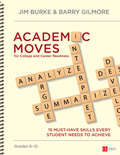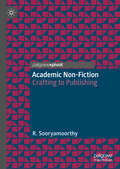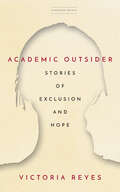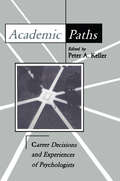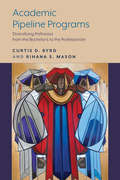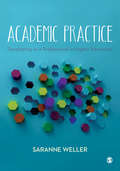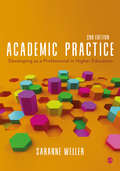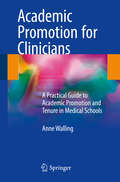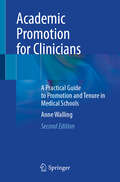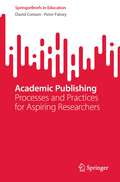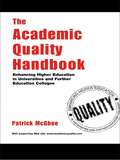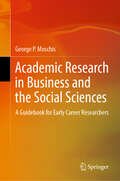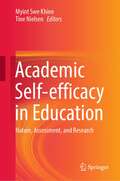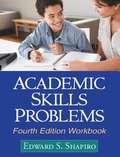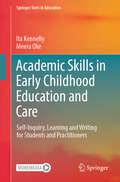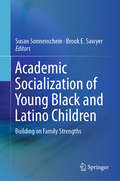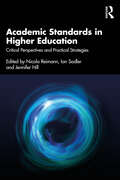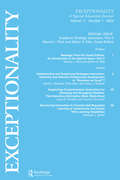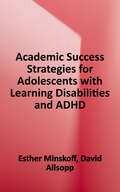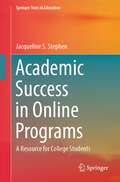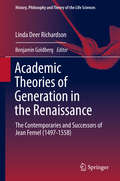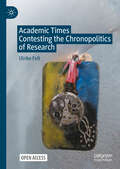- Table View
- List View
Academic Moves for College and Career Readiness, Grades 6-12: 15 Must-Have Skills Every Student Needs to Achieve
by Jim BurkeDepth matters! Can a mere fifteen words turn today’s youth into the innovative, ambitious thinkers we need? Yes, contend Jim Burke and Barry Gilmore, because these are the moves that make the mind work and students must learn if they’re to achieve academically. With Academic Moves, Jim and Barry distill each of these 15 powerhouse processes into a potent concision that nevertheless spans core subject areas: Before, during, and after sections offer essential questions, lesson ideas, and activities. Student samples illustrate what to look for and the process for getting there. Culminating tasks include producing an analytic essay, argument, and more. Reproducible rubrics assist with assessment.
Academic Non-Fiction: Crafting to Publishing
by R. SooryamoorthyThis book offers comprehensive directions to crafting academic nonfiction that is both rigorous and captivating, filling a critical gap in the genre. While academic nonfiction plays a vital role in fostering knowledge-based societies and driving economic growth, there has long been a need for a resource that helps authors create works that are as engaging as they are informative. Designed for both aspiring and established writers, this book provides practical advice and innovative techniques to elevate nonfiction writing. It covers everything from selecting marketable topics and developing effective writing habits to managing time and navigating the complexities of the publication process. Unlike most writing guides, it emphasises how to infuse nonfiction with the allure and engagement necessary to reach a broad audience without compromising accuracy or depth. With short, digestible chapters, insider tips on proposal writing, and insights into the peer review process, this book serves as a step-by-step roadmap to transforming academic writing into compelling works. Essential for writers aiming to produce nonfiction that not only informs but also resonates with readers, this resource is an indispensable tool for creating impactful scholarly work.
Academic Outsider: Stories of Exclusion and Hope
by Victoria ReyesMany enter the academy with dreams of doing good; this is a book about how the institution fails them, especially if they are considered "outsiders." Tenure-track, published author, recipient of prestigious fellowships and awards—these credentials mark Victoria Reyes as somebody who has achieved the status of insider in the academy. Woman of color, family history of sexual violence, first generation, mother—these qualities place Reyes on the margins of the academy; a person who does not see herself reflected in its models of excellence. This contradiction allows Reyes to theorize the conditional citizenship of academic life—a liminal status occupied by a rapidly growing proportion of the academy, as the majority white, male, and affluent space simultaneously transforms and resists transformation. Reyes blends her own personal experiences with the tools of sociology to lay bare the ways in which the structures of the university and the people working within it continue to keep their traditionally marginalized members relegated to symbolic status, somewhere outside the center. Reyes confronts the impossibility of success in the midst of competing and contradictory needs—from navigating coded language, to balancing professional expectations with care-taking responsibilities, to combating the literal exclusions of outmoded and hierarchical rules. Her searing commentary takes on, with sensitivity and fury, the urgent call for academic justice.
Academic Paths: Career Decisions and Experiences of Psychologists
by Peter A. KellerThis book contains the intimate autobiographies of 13 psychologists who work in academic settings. Their experiences are as diverse as their specializations and the academic institutions from which they come. However, all of the contributors have in common an infectious enthusiasm for their academic experiences and the unique opportunities provided by their careers. Psychology students often have only vague notions about the career experiences and personal lives of academic psychologists. The autobiographies in this book open special windows onto the lives of psychologists in academic settings. The contributions range from a description of experiences at a two-year community college through discussions of the demands at high powered doctoral-level research institutions. The authors offer intimate glimpses of experiences in their lives that paved the way to academia. Although this book is, in a sense, about career planning in academic settings, there is no pretense about it being a career planning guide. The editor's goal was to give readers some sense of what motivates academic psychologists and what their personal as well as professional lives are like. The editor also makes clear his belief that there is no single pathway to a successful academic career in psychology. Although each contributor describes what most would see as a successful career, the academic paths taken and the personal and professional rewards received are often quite different. This book will provide encouragement to students contemplating a career in academia as well as interesting reading for psychologists curious about what makes their academic colleagues tick.
Academic Pipeline Programs: Diversifying Pathways from the Bachelor's to the Professoriate
by Curtis D. Byrd Rihana S. MasonAcademic pipeline programs are critical to effectively support the steady increase of diverse students entering the academy. Academic Pipeline Programs: Diversifying Bachelor's to the Professoriate describes best practices of successful academic government and privately funded pre-collegiate, collegiate, graduate, and postdoctoral/faculty development pipeline programs. The authors explore 21 hallmark academic pipeline programs using their THRIVE index: Type, History, Research, Inclusion, Identity, Voice, and Expectation. The final chapter of the book offers information for using and starting similar programs. The appendix offers an interactive Geographic Information System (GIS) mapped database of programs using the THRIVE index. This book will equip parents, high school counselors, college advisors, faculty, department chairs, and higher education administrators to identify academic pipeline programs that fit their needs. Readers will also learn about how academic pipeline programs are situated within an institutional or organizational change model.
Academic Practice: Developing as a Professional in Higher Education
by Saranne WellerLecturers, if you would like to order an e-Inspection copy, go here to order. Taking a broad contemporary view of higher education, this book explores key topics that all academics will need to engage with in order to survive and flourish in today’s increasingly complex higher education environment. Key topics include: · connecting research and teaching in practice · promoting critical approaches to the curriculum · teaching for employability and understanding graduate identity · responding to the internationalisation agenda · engaging with the demands of the digital university · enacting interdisciplinary approaches to teaching and scholarship · enabling inclusive approaches to student engagement and student voice Policy and practice debates informing these different areas are explored alongside practical guidance on how to implement and integrate key priorities into the different dimensions of their professional practice. This is essential reading for higher education faculty undertaking professional development courses, such as the PG Certificate in Academic Practice (PGCAP), the PG Certificate in Teaching and Learning in Higher Education (PGCTLHE / PGHE) and related courses, and also for early career academics wishing to deepen their understanding of contemporary higher education.
Academic Practice: Developing as a Professional in Higher Education
by Saranne WellerLecturers, if you would like to order an e-Inspection copy, go here to order. Taking a broad contemporary view of higher education, this book explores key topics that all academics will need to engage with in order to survive and flourish in today's increasingly complex higher education environment. Key topics include: · connecting research and teaching in practice · promoting critical approaches to the curriculum · teaching for employability and understanding graduate identity · responding to the internationalisation agenda · engaging with the demands of the digital university · enacting interdisciplinary approaches to teaching and scholarship · enabling inclusive approaches to student engagement and student voice Policy and practice debates informing these different areas are explored alongside practical guidance on how to implement and integrate key priorities into the different dimensions of their professional practice. This is essential reading for higher education faculty undertaking professional development courses, such as the PG Certificate in Academic Practice (PGCAP), the PG Certificate in Teaching and Learning in Higher Education (PGCTLHE / PGHE) and related courses, and also for early career academics wishing to deepen their understanding of contemporary higher education.
Academic Practice: Developing as a Professional in Higher Education
by Saranne WellerThis book gives a broad overview of the issues faced by early career academics and explores a variety of topics from curriculum planning to employability. Fully updated throughout, key features of this second edition include: - Two new chapters on HE assessment and becoming a supervisor - New case studies in every chapter - What 'the TEF' means for universities This is essential reading for higher education faculty undertaking professional development courses, such as PG Certificate in Academic Practice (PGCAP), the PG Certificate in Teaching and Learning in Higher Education (PGCTLHE/PGHE) and related courses, and also for early career academics wishing to deepen their understanding of contemporary higher education.
Academic Practice: Developing as a Professional in Higher Education
by Saranne WellerThis book gives a broad overview of the issues faced by early career academics and explores a variety of topics from curriculum planning to employability. Fully updated throughout, key features of this second edition include: - Two new chapters on HE assessment and becoming a supervisor - New case studies in every chapter - What 'the TEF' means for universities This is essential reading for higher education faculty undertaking professional development courses, such as PG Certificate in Academic Practice (PGCAP), the PG Certificate in Teaching and Learning in Higher Education (PGCTLHE/PGHE) and related courses, and also for early career academics wishing to deepen their understanding of contemporary higher education.
Academic Profiling: Latinos, Asian Americans, and the Achievement Gap
by Gilda L. OchoaToday the achievement gap is hotly debated among pundits, politicians, and educators. In particular this conversation often focuses on the two fastest-growing demographic groups in the United States: Asian Americans and Latinos. In Academic Profiling, Gilda L. Ochoa addresses this so-called gap by going directly to the source. At one California public high school where the controversy is lived every day, Ochoa turns to the students, teachers, and parents to learn about the very real disparities—in opportunity, status, treatment, and assumptions—that lead to more than just gaps in achievement.In candid and at times heart-wrenching detail, the students tell stories of encouragement and neglect on their paths to graduation. Separated by unequal middle schools and curriculum tracking, they are divided by race, class, and gender. While those channeled into an International Baccalaureate Program boast about Socratic classes and stress-release sessions, students left out of such programs commonly describe uninspired teaching and inaccessible counseling. Students unequally labeled encounter differential policing and assumptions based on their abilities—disparities compounded by the growth in the private tutoring industry that favors the already economically privileged.Despite the entrenched inequality in today&’s schools, Academic Profiling finds hope in the many ways students and teachers are affirming identities, creating alternative spaces, and fostering critical consciousness. When Ochoa shares the results of her research with the high school, we see the new possibilities—and limits—of change.
Academic Promotion for Clinicians: A Practical Guide to Academic Promotion and Tenure in Medical Schools
by Anne WallingThis book is a practical guide to the appointment, promotion, and tenure (APT) process for clinical faculty members employed by medical schools. The number of clinical faculty members in US medical schools has increased exponentially in the last two decades. At the same time, faculty career tracks and promotion requirements have changed dramatically and medical schools have introduced multiple non-tenure career tracks. Currently, only about 25% of the approximately 150,000 members of clinical departments. This book provides insights and recommendations on career planning and academic promotion for clinical faculty members. It also addresses much of the "mythology" surrounding the APT process and demonstrates how academic promotion should be used as a career-building process rather than a daunting high-risk event. Topics include concepts and processes within academic promotion; navigating the academic promotion and tenure process; and managing the outcome of the APT application. Academic Promotion for Clinicians is a valuable resource for clinical medicine faculty members as they engage in and successfully handle the challenges in the APT process and thus realize their career goals.
Academic Promotion for Clinicians: A Practical Guide to Promotion and Tenure in Medical Schools
by Anne WallingThis book is a practical guide to the appointment, promotion, and tenure (APT) process for clinical faculty members of medical schools. It provides insights and recommendations on career planning and academic promotion for clinical faculty members. It also addresses much of the “mythology” surrounding the APT process and demonstrates how academic promotion should be approached as a career-building process rather than a daunting high-risk event. Topics discussed in the first edition include concepts and processes within academic promotion; navigating the academic promotion and tenure process; and managing the outcome of the APT application. Academic Promotion for Clinicians is a valuable resource for clinical medicine faculty members as they engage in and successfully address the challenges of the APT process to realize their career goals. The biggest change for the new edition is the incorporation of the growing literature and many recent developments regarding career development and promotion for non-tenure track faculty including new chapters addressing the specific concerns of the largest groups, clinician-educators and those heavily involved in research or patient care. Since the previous edition, the faculty of US medical schools has grown by 25% to over 200,000 individuals, 75% of whom are physicians. Only 21% of faculty members have achieved professorial rank. This book aims to encourage interest in academic promotion and provide practical assistance to the 96,000 assistant professors and 42,000 associate professors in US medical schools. Women and members of groups historically underrepresented in medicine (URM) face unique issues in navigating academic promotion systems. These issues have received greater attention from institutions and in the literature since the first edition. The revision includes a summary of national and institutional efforts to make academic careers and promotion more desirable and feasible for women and faculty members from URM and other disadvantaged backgrounds, including discussion of outcomes and future directions for such programs. The sections on faculty perceptions and attitudes towards promotion have also been heavily revised to include consideration of the influence of important events and trends since the previous edition such as the COVID pandemic, transition of the last cohort of baby boomers into retirement age groups, and developments in literature on professional identity and career motivation. The update also addresses the influence of the growing “feminization of medicine” on academic careers. Since 2013, the number of female faculty members has risen from 61,000 (38% of total) to 85,000 (44%). Currently, 59% of instructors, 48% of assistant professors, and 41% of associate professors are women. The accelerating “flight from tenure” in clinical departments is also addressed. Updated data and graphs demonstrate the dramatic changes in tenure-related appointments of clinicians and the substantial differences across specialties. In 2023 only 19% of fulltime clinical faculty hold tenure-related appointments but this ranged from around 11% in family medicine to over 33% in public health and preventive medicine. The new edition expands the discussion of the implications of these trends on expectations for career development, and on the criteria and systems for academic promotion for clinicians. Finally, the book provides updated information on external and internal changes in the medical school environment that impact faculty careers and academic promotion. These include significant revision of the process and requirements for LCME accreditation; the demands and consequence of the “medical education revolution” and widespread curricular reforms; growing significance of team science, translational, applied and other non-traditional research; financial and other pressures on academic health centers; the continuing blurring of the distinctions between academic and other clinical institutions; and initiatives to recruit and retain non-traditio
Academic Publishing: Processes and Practices for Aspiring Researchers (SpringerBriefs in Education)
by David Coniam Peter FalveyThis book focuses on the topic of academic publishing. It discusses the mounting, serious problems that researchers, particularly new researchers, encounter when trying to publish their research. The book addresses the issues of publishing as well as the salient factors militating against academic publication and the mitigating factors encouraging academic publication. It provides potential solutions, suggestions, and strategies for overcoming some of these problems. Growing research output from Southeast Asia including Singapore, Malaysia, Taiwan, and China reveals the struggles that many authors have to confront when attempting to publish their work in reputable journals. In both South Africa and other parts of Africa, academic researchers are beginning to show strong evidence of credible academic output. These researchers all need valid outlets for their work and the security that authentic peer review brings to the reviewing process. In the fields of education, social sciences, and professional practices, e.g., architecture and law, recent years have seen the emergence of new outlets for practitioners’ research outputs in areas such as one’s own practice, self-reflection, and narrative inquiry. These outlets are discussed in this book. The book also discusses the malign influence of predatory publications in detail. This book will be beneficial to university academics, postgraduate students, Ph.D. supervisors, and new researchers.
Academic Quality Handbook Rb: Enhancing Higher Education In Universities And Further Education Colleges
by Patrick McgheeFirst Published in 2004. Routledge is an imprint of Taylor & Francis, an informa company.
Academic Research in Business and the Social Sciences: A Guidebook for Early Career Researchers
by George P. MoschisThis book provides doctoral students, junior faculty and early-career researchers with guidelines, resources and strategies for performing and publishing academic research successfully. It helps increase the productivity of researchers by showing efficient and effective ways to increase research output and publication probability, ranging from manuscript preparation and positioning to working with co-authors and journal reviewers. The author uses research findings, anecdotal evidence and illustrations from his academic career to support his views on strategies and tactics that are required of scholars in order to succeed.
Academic Self-efficacy in Education: Nature, Assessment, and Research
by Myint Swe Khine Tine NielsenThis book documents systematic, prodigious and multidisciplinary research in the nature and role of academic self-efficacy, and identifies areas for future research directions within the three sections of the book: 'Assessment and Measurement of Academic Self-efficacy', 'Empirical Studies on What Shapes Academic Self-efficacy', and 'Empirical Studies on Influence of Academic Self-efficacy'. The book presents works by educators and researchers in the field from various parts of the world, highlighting advances, creative and unique approaches, and innovative methods. It examines discussions around the theoretical and practical aspects of academic self-efficacy in culturally and linguistically-diverse educational contexts. This book also showcases work based on classical and modern test theory methods, mediation and moderation analysis, multi-level modelling approaches, and qualitative analyses.
Academic Skills Problems, Fourth Edition
by Edward ShapiroThis popular practitioner guide and text presents an effective, problem-solving-based approach to evaluating and remediating academic skills problems. Leading authority Edward S. Shapiro provides practical strategies for working with students across all grade levels (K-12) who are struggling with reading, spelling, written language, or math. Step-by-step guidelines are detailed for assessing students' learning and their instructional environment, using the data to design instructional modifications, and monitoring student progress. The research base for the approach is accessibly summarized. The companion workbook, available separately, contains practice exercises and reproducible forms. New to This Edition Incorporates the latest advances in evidence-based assessment and instruction. Shows how the author's approach fits perfectly into a response to intervention (RTI) model. Chapter and extended case example focusing on RTI.30 of the figures, tables, and forms are new or revised.
Academic Skills in Early Childhood Education and Care: Self-Inquiry, Learning and Writing for Students and Practitioners (Springer Texts in Education)
by Ita Kennelly Meera OkeThis book supports the development of academic, personal, and professional skills for students of Early Childhood Education and Care (ECEC). It aims to demystify aspects of learning and writing practices and can be used by students as a practical resource to enhance their engagement with education and to support their success on their programmes. The book guides students in a range of areas to help their academic development including study techniques, time management, managing groupwork, understanding assessment requirements, academic writing and how to work effectively within a digital learning environment. In addition, the book features a strong personal and professional development dimension which enables readers to engage in a process of self-inquiry as part of their learning. This self-inquiry is important to understanding assumptions about learning and can help students to explore their prior educational experiences and to identify their particular motivations and challenges. The book extends this self-inquiry to support the development of reflective practice which is key to enhancing students' learning and to enabling the ongoing professional development and practice of the ECEC educator. While many ECEC undergraduate programmes offer academic guidance to students, there is a gap for a more embedded academic support which is discipline specific and therefore more closely attuned to the needs of the ECEC student and the emerging needs of the sector. In addition to providing a resource for students and practitioners, this book can also serve as a useful resource for lecturers in the ECEC discipline. Its accompanying site contains downloadable templates from the book which provide a range of activities and prompts suitable for engaging students in thinking about their learning and writing about their professional practice.
Academic Socialization of Young Black and Latino Children: Building on Family Strengths
by Susan Sonnenschein Brook E. SawyerThis book offers a strengths-based, family-focused approach to improving the educational performance and school experience of struggling Black and Latino students. The book discusses educational challenges faced by low-income families of color and the different strengths within Black and Latino family life that can affect these challenges. It focuses building on these strengths within the children’s home environments that can serve as a foundation for subsequent learning. The chapters describe a wide range of family practices and beliefs, including development of interventions to support families that promote early language and literacy, early mathematics, and social skills. The chapters also present quantitative and/or qualitative studies using a strengths-based approach to parents’ socialization of their children’s early academic skills.
Academic Standards in Higher Education: Critical Perspectives and Practical Strategies
by Nicola ReimannAcademic standards in higher education are important but largely misunderstood. This book examines the notion of academic standards, explaining what they are and why they are important, and identifying the many myths that surround them.Based on the lessons learnt from the UK-wide Degree Standards Project, which developed, piloted and evaluated a professional development course on degree standards aimed at external examiners, the book offers practical suggestions for ways in which higher education staff can develop a more sophisticated understanding of standards. It discusses the implications of rethinking academic standards for higher education policy and practice, through examples and case studies derived from research evidence, the Degree Standards Project and contributors’ own experience and expertise. As a broader approach to assessment literacy, this volume aims to develop readers’ standards literacy by challenging routine practices and proposing promising alternatives.Written with a diverse readership in mind, this book is relevant to discipline-based academics, quality officers, academic developers, university leaders and managers, as well as policy makers.
Academic Strategy Instruction: A Special Issue of Exceptionality
by Marcia L. Rock Edwin S. EllisThis special issue, Part II in a series devoted to the topic of strategic instruction, explores the issue of traversing the research to practice abyss through the implementation of authentic and effective business development. It reminds us that "business as usual" approaches to teacher in-service programs are unlikely to produce meaningful changes in teachers' classroom practices. In addition, this issue offers strategic instructional approaches to facilitate students' learning and focuses on structuring instruction to promote self-regulated learning. Each article raises important questions about existing practices and offers innovative alternatives to improve outcomes for students and teachers.
Academic Success Strategies for Adolescents with Learning Disabilities and ADHD
by David Allsopp Esther MinskoffWith this strategy-filled handbook, education professionals will learn what they can do to help students with mild disabilities—from high school to post-high school—develop academic skills in: organization, test-taking, study skills, note taking, reading, writing, and math. <p><p> First, educators will work one-on-one with students to evaluate each student's learning style and individual needs. Then, for each of the areas listed above, educators will get a chapter with step-by-step cognitive learning strategies, case studies, and charts that summarize the steps as mnemonic devices. An overarching five-step model (the Active Learner Approach) for effective instruction helps teachers introduce these strategies to students, model the steps of the strategies for them, give students guided and independent practice applying the strategies to assignments, and assist students in generalizing the strategies to other subjects and settings. <p><p>With this easy-to-use guide, educators will be able to help students recognize their learning characteristics, apply strategies to meet the specific demands of their coursework independently, and reach their educational goals.
Academic Success in Online Programs: A Resource for College Students (Springer Texts in Education)
by Jacqueline S. StephenThis book provides higher education students with a comprehensive resource to assist them in their academic persistence in an online course or program. It addresses a wide selection of topics emphasizing a myriad of factors that impact a student’s persistence, and ultimate success, in an online program or course. The book helps students to gain insight into the skills, knowledge, and attributes needed to succeed in the autonomous nature of an online learning environment. Thus, this book helps students to proactively engage in activities to prepare for online learning. Information presented in each chapter is drawn from theory and recent research centered on persistence of online students in higher education. It incorporates hands-on practical activities to promote application of theory and research, and encourages students to demonstrate their knowledge, skills, and abilities through the use of reflective and thought-provoking activities. Hence, this book provides online students with an up-to-date resource they can use to develop an awareness of their readiness and preparedness for online learning. Additionally, this book equips students with information and strategies aimed at helping them to address gaps in their skills and knowledge that may present them with barriers to academic success. The content of this book is aligned with widely used student learning outcomes and objectives of first-year student seminar courses and orientation programs for graduate and undergraduate students enrolled in online programs. Furthermore, it is deliberately organized and structured to support an online student’s academic journey as they navigate the online learning environment. As such, these features make it an ideal book for use by students, instructors, and academic advisors or college and university academic support staff.
Academic Theories of Generation in the Renaissance: The Contemporaries and Successors of Jean Fernel (1497-1558) (History, Philosophy and Theory of the Life Sciences #22)
by Benjamin Goldberg Linda Deer RichardsonThis volume deals with philosophically grounded theories of animal generation as found in two different traditions: one, deriving primarily from Aristotelian natural philosophy and specifically from his Generation of Animals; and another, deriving from two related medical traditions, the Hippocratic and the Galenic. The book contains a classification and critique of works that touch on the history of embryology and animal generation written before 1980. It also contains translations of key sections of the works on which it is focused. It looks at two different scholarly communities: the physicians (medici) and philosophers (philosophi), that share a set of textual resources and philosophical lineages, as well as a shared problem (explaining animal generation), but that nevertheless have different concerns and commitments. The book demonstrates how those working in these two traditions not only shared a common philosophical background in the arts curricula of the universities, but were in constant intercourse with each other. This book presents a test case of how scholarly communities differentiate themselves from each other through methods of argument, empirical investigation, and textual interpretations. It is all the more interesting because the two communities under investigation have so much in common and yet, in the end, are distinct in a number of important ways.
Academic Times: Contesting the Chronopolitics of Research
by Ulrike FeltThis open access book explores the hidden politics of time—the chronopolitics—that profoundly shapes the contours of academic life and knowledge production in contemporary universities. Moving beyond familiar critiques of academic acceleration, Ulrike Felt explores the diversity of time generators and the resultant complex, multilayered timescapes that govern scholarly work and life. The book examines the tensions inherent in models of linear careers and in simultaneous experiences of speed and waiting, and asks questions about the ownership of time. In doing so, it scrutinizes relations between time and quality, and points to the impact of time on how and what we can know, revealing how these temporal regimes create deep asynchronicities and fragmentations and perpetuate injustices and exclusions. Arguing for a more mindful approach to research, Felt advocates for rethinking academia through the lens of time, emphasizing the need for temporal care work in order to achieve sustainable and responsible change. Aimed at researchers, academic leaders, and policymakers, the book offers a compelling vision for a more responsive, long-term, and equitable academic future—one that challenges neoliberal models that prioritise speed, competitiveness, and efficiency.
